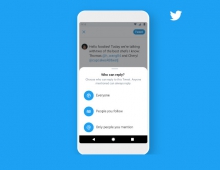
Twitter and Facebook Reveal Measures to Bring Transparency to Political Ads
Facebook on Thursday launched an archive of U.S. political ads that appear on the world's largest social network, showing who paid for them and other details. Separately, Twitter rolled out stricter rules for political advertising in a bid to increase transparency and curb manipulation on the service ahead of U.S. midterm elections.
Twitter said Thursday in a blog post it would require advertisers running political campaign ads for federal elections to identify themselves and certify they are located in the U.S.
Candidates and committees must provide their Federal Election Commission identification and non-FEC registered organizations will have to submit a notarized form. Twitter said it won't let foreign nationals target political ads to U.S. residents.
The rules are part of Twitter's efforts to clean up the social-media platform after revelations of Russian influence during the 2016 U.S. presidential election. The San Francisco-based company has banned Russian state media accounts from buying ads and is creating a "transparency center" beginning soon to show how much political campaigns spend on advertising, the identity of the organization funding the campaign and what demographics the ads targeted.
Twitter also plans to place a visual badge and disclaimer information on promoted content from certified accounts, which identifies who sponsored or paid for the tweet.
For its part, Facebook is expanding its advertising disclosure requirements to cover all U.S. ads on polarized issues such as gun control and abortion rights, even if they don't endorse a particular candidate.
Ads coming from specific candidates have already included a disclosure label since October. Facebook has said it would require that of issue ads from outside parties, too, but it didn't provide details until Thursday, when the expanded requirements took effect.
Facebook says that when users click on the label on this kind of ad, they will be taken to a page with more information, including who paid for it and how many people saw it.
Facebook has already said it would require anyone who wants to buy issue ads in the U.S. to confirm their identity and location.





















